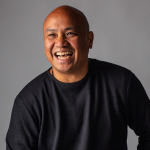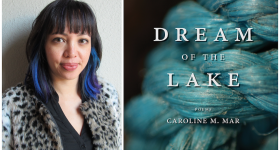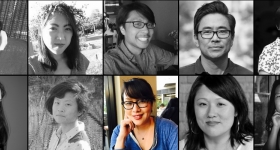Guitar
by Patrick Rosal
For Sheila who wants to learn to play
The bottom end’s a little shallow
and you might need to shim the bridge
to hush the fifth-fret buzz. The action’s low
and the neck, a tad warped, but I swear,
this thing sings. For ten years,
I’ve accompanied lovers, convicts, and children
with this guitar, bought it with my last
hundred bucks, fifty more perhaps
than it was worth that day.
I just wanted to touch nylon again,
to play the way my Uncle Eli used to,
‘til cancer mugged him for his lungs. He sang, Sheila,
and the guitar did too. And that kind of singing
was like eleven acres of sky to a nine-year-old kid
terrified of a 50 mile-per-hour hard ball.
The summer my father came back
from burying his mother in the Philippines,
he told my brother and me, the two oblong
boxes he pulled off the luggage conveyor
were ours. Once home, we pried the cardboard
apart, tearing the packing tape
and snapping the industrial staples
loose with our bare hands. I ran my fingers
slow around the slick soundhole edge.
I stuck my nose into the strings to smell
the jackfruit wood stewing inside
and when I pulled my face away,
the instrument made its first silken hum.
I don’t know if you believe in time
the way I do, but when history touches us
it’s like hearing a skinny uncle sing
with a cigarette dangling from his lips
without one note of misery in his dying,
and the guitar he’s holding is yours.
You might not understand the words sailing
past you, but one day, years later, on a drive back
to Rockland maybe, where an old woman
scolded you as a child or kissed the small bones
of your shoulders, you may find yourself
singing, out of nowhere, that tune. I mean to say,
I never thanked my father for that first guitar.
I smashed it in a tantrum against my heel
and didn’t own another until this one.
I should warn you, every guitar has its ghosts,
and they’ll ask you whom you love and how much.
As for learning. your hands are going to ache
a little while, but one day, when the chords come easy,
the guitar will whisper to you some old secret.
Whisper back. The most beautiful intervals are ancient
and imperfect. They will teach you to love
something so deep, you will want
nothing better than to give it all away
From Boneshepherds by Patrick Rosal. Copyright © 2011 by Patrick Rosal. Reprinted with permission of Persea Books, Inc., New York.
**
Demystifying the Music with Award-Winning Poet Patrick Rosal
by Karissa Chen
Tell me about this poem and where it comes from.
Sheila, a friend of mine, mentioned in passing that she wanted to learn to play guitar. So I gave her one.
I come from a family of musicians and music teachers. I also have an impractical impulse to give things away — books especially. I've given guitars away on several occasions. I'm by no means rich but I wonder if we, as a culture, care enough about our amateurs. Wendell Berry points out that the word “amateur” in French means “one who loves.” By encouraging amateurs, we are making, hopefully, not just players but audiences who have a greater appreciation for how interwoven mastery and play are with one another.
Music seems to be really important in your third collection of poems, Boneshepherds, released last year. Could you speak about your relationship to music?
One of my earliest musical memories is sitting at our new piano in the living room and figuring out harmonic and melodic triads. I didn't know what they were called at the time, and it wasn't exactly music. But god, I remember being completely sucked in by how two or more notes could sound together. I must have been 8 or so.
I was a weird kid. I didn't look like anyone in my Hungarian/black/Puerto Rican neighborhood. I liked sports but wasn't great at them. My folks were always screaming at each other. I already liked picking fights around my block. My brothers and I are five years apart, so we didn't really play much together. In short, I knew what loneliness was like when I was very young. But there was always music in our house: My dad often played Clementi’s sonatinas and Philippine folk songs on the piano; my brother had Led Zeppelin and Stevie Wonder on vinyl and played guitar; my mom sang my little brother to sleep; and by the time I was 12, there was Kurtis Blow and Afrika Bambaataa on the corner. Music made more sense to me than all the rage and sadness of my childhood.
Music was a way for me to be so deeply immersed in the real world that the real world’s chaos finally made some sense — even if just for a little while. Frost called poetry “a temporary stay against confusion.” Music was that for me. Still is.
You spent some time in the Philippines on a Fulbright scholarship. What led you to apply and how did that experience contribute to this collection?
With war raging in Iraq, it felt urgent to ask about my own personal legacies of violence as the son of Filipino immigrants, as an American. The US and the Philippines are intrinsically linked when we consider the impulse and consequences of violence. America’s foreign military initiatives are rooted in its war with the Philippines at the turn of the century. It’s daunting and energizing to consider the violence we read about (or don’t read about) in history might be connected to my own rage, which is my father’s rage and brothers’ rage.
Even brutality can make symphonic gestures across space and time. But the gestures against brutality can be symphonic too — or at least musical. And that’s what I’m looking for.
You’ve got experience as both a so-called academic poet, who writes for the page, and a stage poet, who writes with the intent to perform. How do you reconcile the two?
Much of my work comes from disparate sources and unlikely collisions. I think it’s hard, sometimes, for people to hear the voice of the poem. When I perform, they get it. In performance, I draw on the traditions of the diskurso [a tradition in the Philippines where people tell stories to an audience], the dozens [the African American verbal joust of witty insults], the pulpit, the literary reading. And I hope the confluence of traditions — the remix, if you will — engages something deeply human in the audience that elicits laughter, thought, rage, wonderment. Both writing and performing require craft and skill. And the way I see it, craft really is just a way into wonderment.
Who are your big influences and what are you reading these days?
My influences are vast because they span many disciplines. I can list them here incompletely: Amiri Baraka, Philip Levine, Larry Levis, Audre Lorde, June Jordan, Mark Doty, Thomas Lux, Afrika Bambaataa, Bach, the Latin Rascals, Kid Capri, Pablo Casals, the Rock Steady Crew, John Coltrane, Charlie Parker, Paul Genega, Art Tatum, my uncle Charlie.
Mostly, I’m reading what I’m teaching and at the moment, it’s Charles Johnson’s Middle Passage with Valerie Martin’s Property and Ishmael Reed’s Mumbo Jumbo to follow. In terms of poetry, I’m really excited for a number of first books by Asian American poets including Matthew Olzmann, Tamiko Beyer, Dilruba Ahmed and Brynn Saito.










Comments